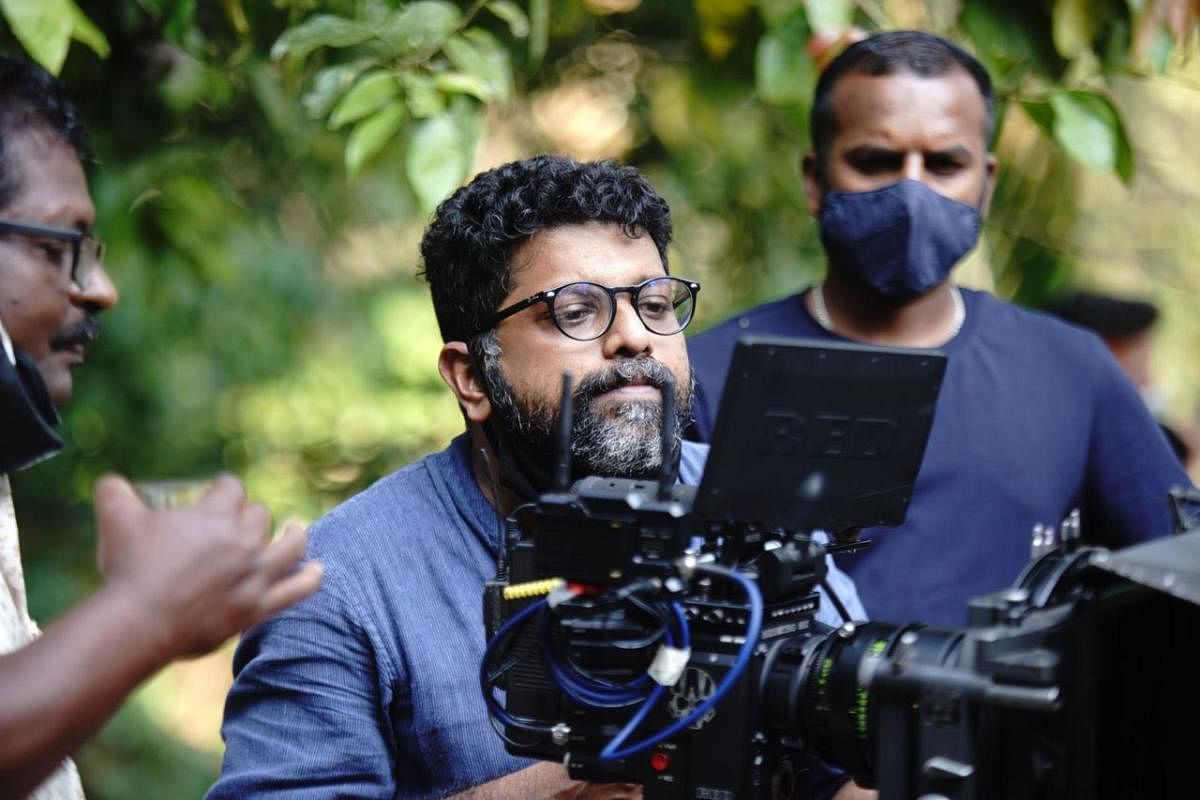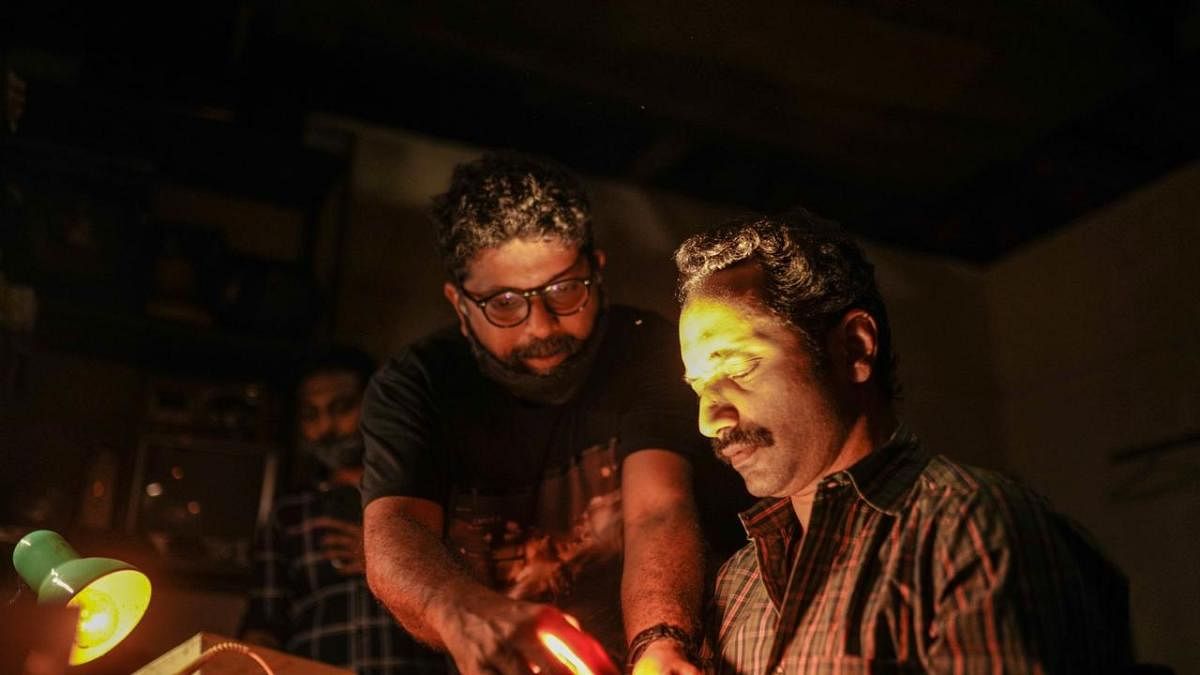

Its fifteen years since Mahesh Narayanan made his debut as a film editor. The spotlight shifted on him when he edited Kamalhaasan’s ‘Vishwaroopam’ (2013). Kamal was probably impressed with his work in ‘Traffic’(2011).
Mahesh is multi faceted but is careful not to wear too many hats simultaneously. He’s written and shot ‘Malayankunju’, an engrossing study of a complex character. The film is directed by Sajimon Prabhakar. As you sit back and figure out your quandary about whether to like or dislike the protagonist, you are sucked underground, literally with him as he tries to survive a landslide. The characters as usual, like in most Malayalam films, are relatable, making it easier to empathise with their predicament. The writing, like Mahesh’s editing, is crisp and of course there’s the ever dependable Fahadh Faasil to bring alive a unique character.
A chat with editor, writer, director and now cinematographer. Excerpts:
Is it because Kamal’s project was delayed that you wrote ‘Malayankunju’?
No. We started shooting this after ‘C U Soon’, even before the release of ‘Maalik’. Fahadh had a big accident during this shoot. We lost six months. Then he had to finish ‘Pushpa’ and ‘Vikram. This was planned for a direct release on OTT because theatres weren’t open yet. Only A R Rahman came onboard later.
What was the genesis for ‘Malayankunju’? It’s off the oft-trodden path.
I take ideas from my surroundings. Kerala has gone through massive floods twice. The idea came from a news report. One dog was travelling with a disaster management team. They didn’t know why. The dog started barking in a particular place. While excavating, they found the body of a child. I thought what if that child was alive. The child was the genesis. Then came the character of Anikuttan.
You spend the first half establishing his character. There’s a tiny flashback too. Why does there always have to be a reason to justify the protagonists social and moral behaviour? This doesn’t happen with an antagonist.
All the characters in my films, protagonist or antagonist, are grey. In certain films I need to establish why this person is behaving in a certain manner. It’s not that there has to be a reason. No person is born evil. In ‘Malayankunju’, we don’t know initially why he’s annoyed with his mother visiting the neighbour. The timeline starts with the infant being brought home. We don’t know what happened previously. Revelations are made only to clear the doubts in the audience’s minds. We don’t want them to think he had an affair with the child’s mother. It’s not about the crying of the child. Caste is the issue
In 2018, when camps were started after mass evacuation, there were problems regarding caste, about sharing toilets and food. I travel and observe. It’s strange that these things come to the fore even in times of distress. This is the mentality of most people. NRIs from Kerala build huge mansions in their hometown just to show supremacy even though they will never return. About your question, I want to emphasise the characters journey. It’s not justification. It’s just to throw light on reasons for his behavior.
Did the editor in Mahesh help in compressing so many thoughts?
Unconsciously yes probably not knowingly. This is the first time I’m travelling with a character. To a certain extent I did with with Sameera in ‘Takeoff’ but only till other characters and situations arrive. Here it’s basically a character study. There’s no scene without Anikuttan. His behavior has to be understood without spoon feeding.
Anikuttan comes across as someone who’s wary of getting close emotionally.
Correct. For example, he has a mobile phone but you never see him receiving a call. He uses the phone to refer to manuals and set an alarm. There’s a wall between the neighbours that disintegrates. It’s a wall he’s built, a sort of social barrier. He firmly believes the tragedy his family has befallen is because of caste. I’ve met people like this in Kerala.
The first half is conventionally longer than the second. Was this a conscious decision?
Yes the second has a lot of claustrophobia in it, nothing dramatic but tiring. The film is around two hours in length but after Rahman’s interpretation he somehow managed to remove the scary part and infused hope with his score. He elevated the second half which flies. The first half is mundane with episodes repeating. Also, Anikuttan is not money minded. In Kerala if someone buys footwear they’ll ask the shopkeeper if it will last till the next monsoon. Anikuttan knows his clientele will return.
I personally felt the background score in the second half is overwhelming diluting the agony Anikuttan is experiencing when natural sounds like water gushing would have enhanced it.
You’re right. We were aware of this. This was our problem. Post Covid, we don’t know the viewers perspective while watching a film in a theatre. I think there would have been more reviews and public response for this kind of film pre Covid. People who would have rushed to theatres, are relaxing, waiting for films on platforms. People who love good cinema have invested on subscriptions and high end TVs. After such loud films like RRR and KGF, people cannot tolerate a moment’s silence. They’re impatient. We were confused about how to draw people to theatres to enjoy this experience. Rahman asked us how we wanted to pitch the music. We are aware of what you mentioned. Maybe for a festival cut the
music will be different.
How difficult is it for a writer/director to give the directorial reins to someone else?
It was not difficult because Sajimon is a part of my team. He’s been a part of all my films. Our sensibilities are alike. It’s a learning experience. For example in ‘Malik’, in the initial draft, it started at the airport. It was Saji’s idea that we should start the film with a feast. It was a minute detailing. Also here, I was trying to learn a new craft, cinematography.
Did it take more time to plan than shoot the second half which is entirely the aftermath of the landslide?
There are no dialogues for most part of the second half. We made a miniature set initially. We planned the depth and the things to be incorporated within our budget. We did research and rehearsals but on the first day of shoot, Fahadh had a massive accident. It appeared simple but we realised it was a narrow escape. Our approach changed. We didn’t have a reference point or the expertise of Hollywood productions. Our primary concern was safety.
The whole set was inside a tank holding one lakh litres of water replaced every day because of Covid. We used a harness for even a tiny climb. Jotish, our art director, did a remarkable job. It doesn’t feel like a set. Even the rocks look authentic. He was meticulous about continuity. The torch Fahadh was carrying was the source of light and he had to play lightman too.
Only Fahadh, I and the focus puller were inside while shooting. Fahadh had to stay in awkward postures sometimes for hours. There was no lunch break. We had to finish and emerge.
Have you unconsciously started writing every script with Fahadh in mind?
No. My next has Kunchako Boban ('Ariyippu) in the lead. ‘Malik’ was the first film we wanted to collaborate. That happened later. Fahadh came onboard ‘Takeoff’ to support the film because he knew I needed one more marquee name. We couldn’t release ‘Malik’ so we made ‘C U Soon’. Saji is a very close friend of Fahadh and me. We wanted him to become a director and ‘Malayankunju’ happened.
Did you enjoy cinematography?
I’m still learning.
Cinema is the only sphere where you can earn while you learn.
That’s true. If I write a script and give it to a director, there’s no purpose for me to go to the sets. Sanu joseph was supposed to shoot this too but was busy. He told me this is a good opportunity to turn cinematographer. It was a chance to be together with friends and work too.
Is it a great weight taken off that Kamal is writing the script for your film with him?
Kamal sir is a great teacher to me. I’ve learnt a lot from him. We constantly discuss cinema. I’m a part of Raaj Kamal. I don’t feel like an outsider.
That’s not the only reason for you to direct his film.
No certain things have to happen. He also knows my sensibilities well. The commercial success that he’s achieved with ‘Vikram’ is phenomenal. I told him I could be a liability coming from a smaller industry. He asked me not to worry. We are still working on it. He too has other commitments but I’m looking forward.